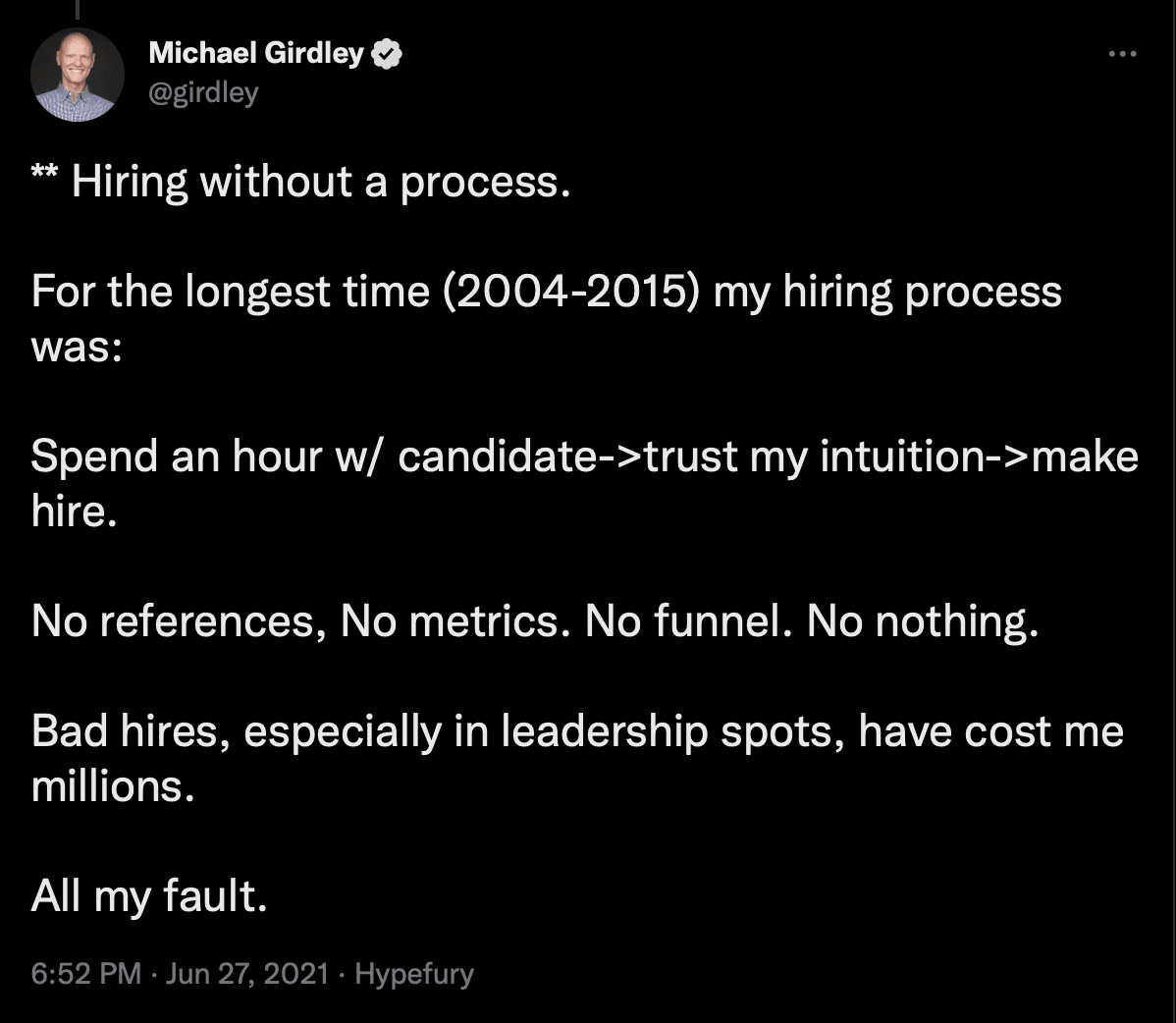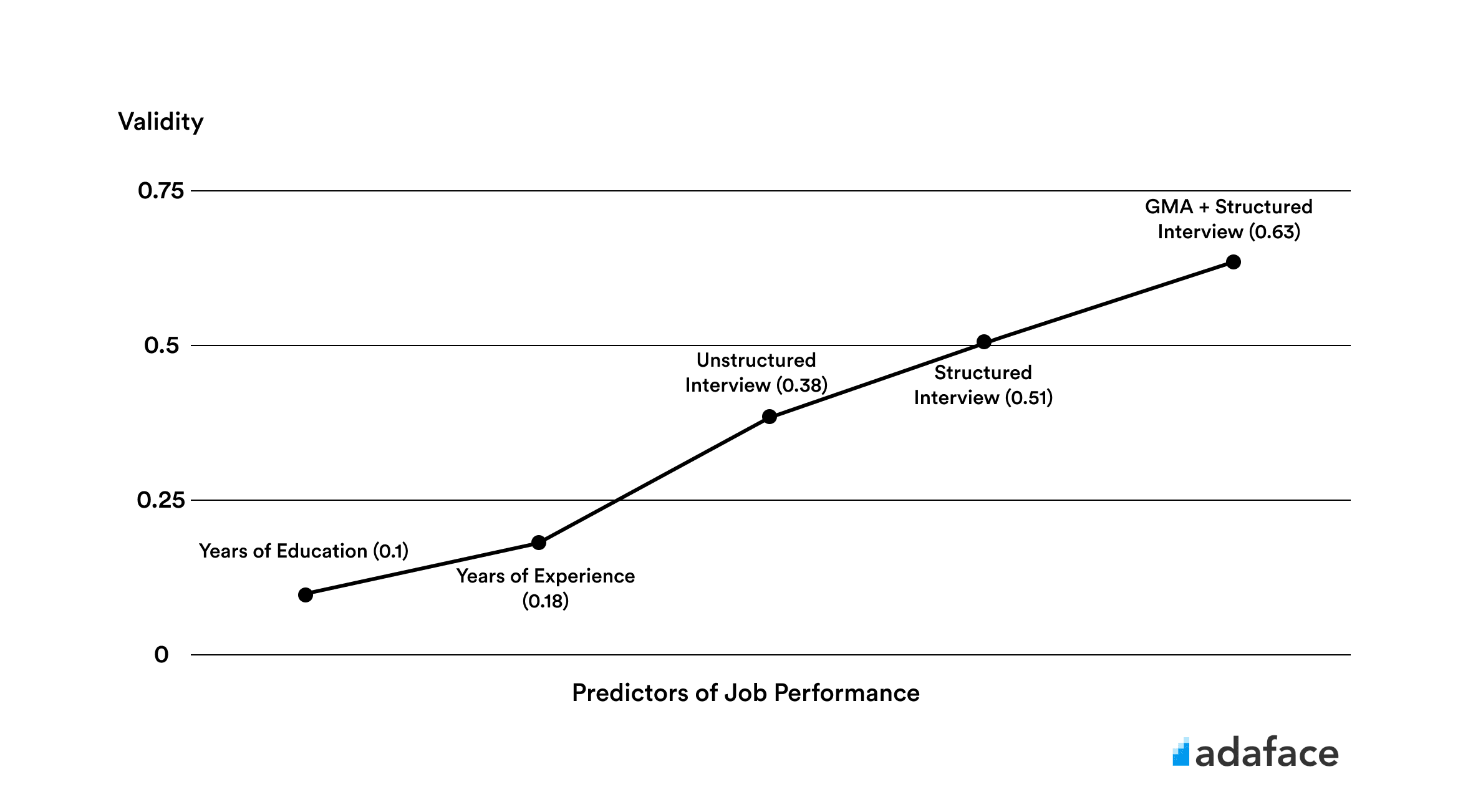

How can you optimize your interview process to ensure that your hiring decisions predict high job performance, reduced costs as well eliminate bias from your decision?
Here we examine the two popular interview techniques: structured and unstructured interviews, use emperical data and research to evaluate the validity of these interview techniques.
What are Structured Interviews?
A structured interview is an interview in which you ask the same set of questions to every candidate you are interviewing. The objective is to test each candidate on the core competencies required for the role and then compare the responses in order to make an informed decision as to who is the best pick of the lot.
Think of structured interviews as tests but in a conversational manner. You give each candidate the same test, and by the end, you evaluate their answers to determine who you feel scored the highest based on your metrics. The candidate with the highest score is the one you hire.
Steps to Conduct a Structured Interview Process
Step 1: Write a clear job description for the role you're hiring.
The first step on your list is to write a clear job description outlining the must-have and good-t0-have requirements for the role. You accomplish this by conducting a detailed analysis of the job and determining the key roles and responsibilities.
Step 2: Plan the questions based on the requirements of the role.
With the job description in hand, you now have a clear overview of what the role entails, the must-have, and the good-to-have responsibilities. Keeping the must-have requirements in mind, write down questions. Remember that the questions must be designed to showcase the candidate's experience or knowledge of that particular responsibility.
Once all the must-have responsibilities are covered, you can include some questions covering the good-to-have responsibilities. Have about 5-6 questions to ask, which covers all these responsibilities as anything more than this, the process may become repetitive and drags the interview longer than required.
Step 3: Set your scoring metrics.
Structured Interviews are about more than just about having the same set of questions to ask. A key part of this approach also involves scoring each candidate along the same set of metrics.
To go about this, assign weights (or importance) to each question, rating them on a scale of 1-5, with one being the least satisfactory and five a perfect response.
For example, if you are looking for the ability to manage external stakeholders, a question you might ask is:
"Tell me about a past experience where you had to work with multiple stakeholders to accomplish a set goal or objective. What were the steps you took to solve this problem?"
Say, for this role, the ability to manage external stakeholders has an importance of 4 on a scale of 5. You evaluate your candidate based on their response, factor in the weight assigned to the question, and average out all the scores to get your final outcome.
Step 4: Conduct your interview.
You now have the questions planned and the metrics you need to evaluate these questions. Now it's time to conduct the interview. Familiarize yourself with the candidate's questions and resume and set a comfortable interview schedule so that it does not have to be rushed.
Although structured interviews are a pre-planned technique, do not conduct the interview as if you're an actor reading from a script. Keep it conversational, but ensure you stick to your questions.
Write notes during the interview to keep track of what you felt about each candidate's response, as you will need it post the interview process.
Step 5: Evaluate responses and make the hire.
With your notes in hand, you can now assign scores to each candidate's response and compare. These scores can be used to shortlist candidates early in the hiring process or to make the final hiring decision in the later stages.
What are Unstructured Interviews?
An unstructured interview is an interview in which the interactions are spontaneous and conversational. You ask questions and interact with the candidate based on how the conversation unfolds. Instead of asking specific questions, the objective is to cover general topics, and you cover them by asking different questions based on how the conversation goes.
When it comes to unstructured interviews, the interviewer does not necessarily ask questions that cover the role's core competencies. Since they ask questions based on how the conversation unfolds, this process can work well only for experienced HR reps with an extensive knowledge of the topic under purview.
Differences
| Structured Interview | Unstructured Interview | |
|---|---|---|
| Definition | A Structured Interview is an interview in which you ask the same set of questions to every candidate you are interviewing. | An Unstructured Interview is an interview in which the interactions are spontaneous and conversational. You ask questions and interact with the candidate based on how the conversation unfolds. |
| Question Types | Pre-planned questions that test core competencies for the role. | Un-planned questions that cover general topics. |
| Approach | Formal and planned process that is used for all candidates. | In-formal and unplanned process that depends on how the conversation unfolds with each candidate. |
| Evaluation | Evaluated based on pre-defined metrics that are planned prior to conducting any of the interviews. | Evaluated solely based on the performance in the interview and does not depend on any pre-defined metrics. |
| Biases | No biases exist since the questions as well as evaluation metrics are pre-defined. | Subject to interviwer bias. |
| Usage | Suited for hiring in all stages to gather quantitative data as well as a qualitative understanding of the candidate. | Suited for hiring in the late stages solely for qualitative understanding of the candidate. |
Keeping these differences in mind, which seems as the better option out of the two interview techniques? Let's explore that in the next section.
Which is Better? Structured vs. Unstructured Interviews
One way of determining the better interview technique is by looking at the popular one.
Google completely shifted their hiring process to structured interviews - asking the same set of predefined questions to each candidate, evaluating them on set metrics, and making data-driven decisions in order to make the most of their hiring process.
In fact, Michael Girdley, whose companies have combined revenues of over $100 million, mentions in this tweet that hiring without a process is one of his biggest mistakes of his life.

Clearly lot of successful companies and founders use structured interviews as their go-to interview technique.
According to research, structured interviews are used by almost 75% of HR professionals making it the most popular interview technique. Empirical data show that structured interviews are the go-to choice, but what makes them better?
There are a number of reasons why structured interviews are superior and hence the more popular interview technique:
Reduces Interview Bias
Structured Interviews consist of pre-defined and pre-planned interview questions that are asked to each candidate irrespective of race or gender. It removes any intentional and unintentional bias that the interviewer may include in the interview process. This results in a diverse group of individuals in the workforce with broad perspectives.
Predicts Job Performance
Research conducted by the American Psychological Association proves that structured interviews are one of the top-ranked procedure for predicting job performance during hiring. Since the questions asked test the core competencies for the role, it is an accurate predictor of job performance. In fact, it is tied with cognitive assessments as the second best predictor of performance (after work sample tests).

Source: Schmidt and Hunter
Reduces Time to Hire
Conducting structured interviews reduces the time taken to hire candidates. With the process being a pre-planned approach, the interviews last for a shorter duration when compared to unstructured interviews. As a matter of fact, Google's Internal Research shows that interviewers are happier with structured interviews as they feel more prepared and saves them an average of 40 minutes per interview.
Reduces Costs
According to research, a bad hire costs approximately $15,000. Since structured interviews are better predictors of job performance, bad hires are less likely to happen. Hiring through unstructured interview techniques can result in repetitive hiring processes due to bad hiring decisions. This can exponentially ramp up the cost of hiring.
Improves Candidate Experience
A pre-planned, high-quality approach to interviews not only leaves recruiters happy but also the candidates. The same Google Internal Research shows that candidate experience improved significantly with structured interviews.
Surprisingly, research shows that the experience of rejected candidates improved by as much as 35% in a structured interview process.
This indicates that not only candidates who are hired enjoy the interview process; even those who are rejected feel the process is well-planned and fair.
On a Final Note
Whether you are an amateur HR professional or an experienced recruiter with extensive knowledge across industries, structured interviews are the clear outstanding choice. If you want to avoid repetitive hiring costs, reduce time to hire and onboard candidates who will prove to have high job performance; ensure that you have a structured approach to interviews during your hiring process.

Pragnesh is the EiR at Adaface. He loves reading books more than scrolling through social media, which is a big deal if you ask him.
Spending too much time screening candidates?
We make it easy for you to find the best candidates in your pipeline-
with a 40 min skills test.


